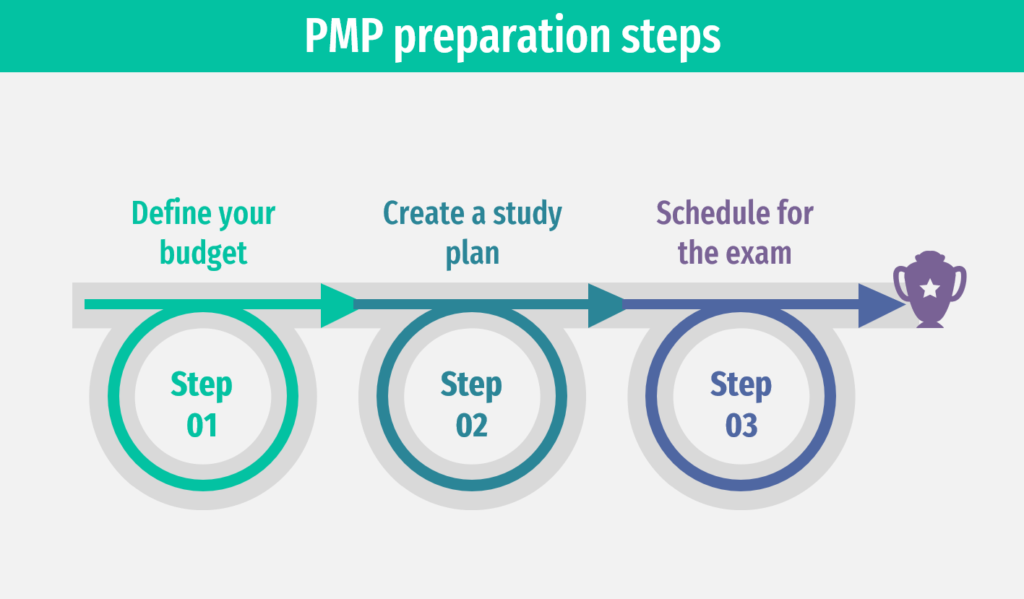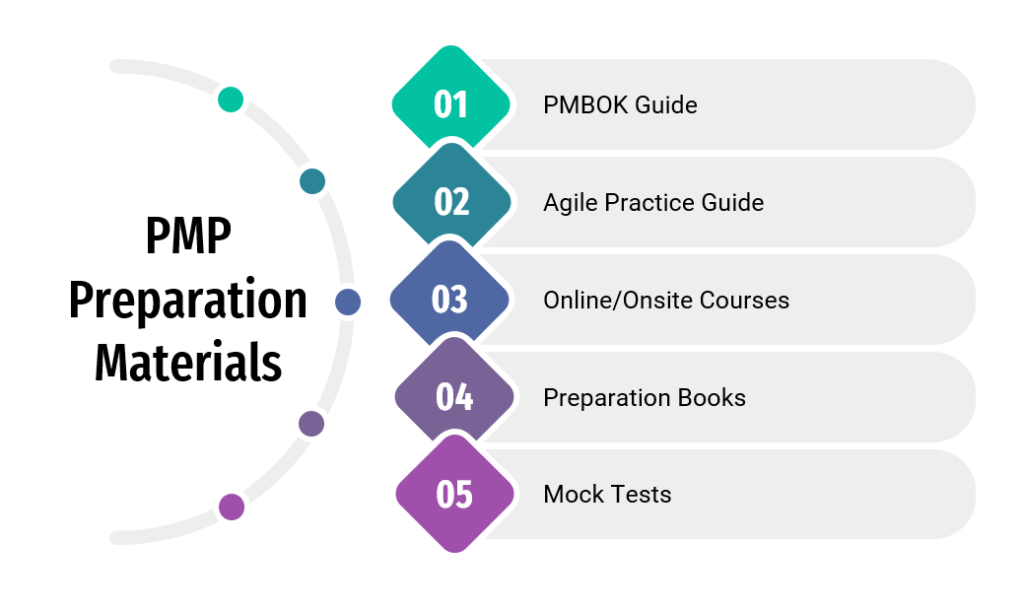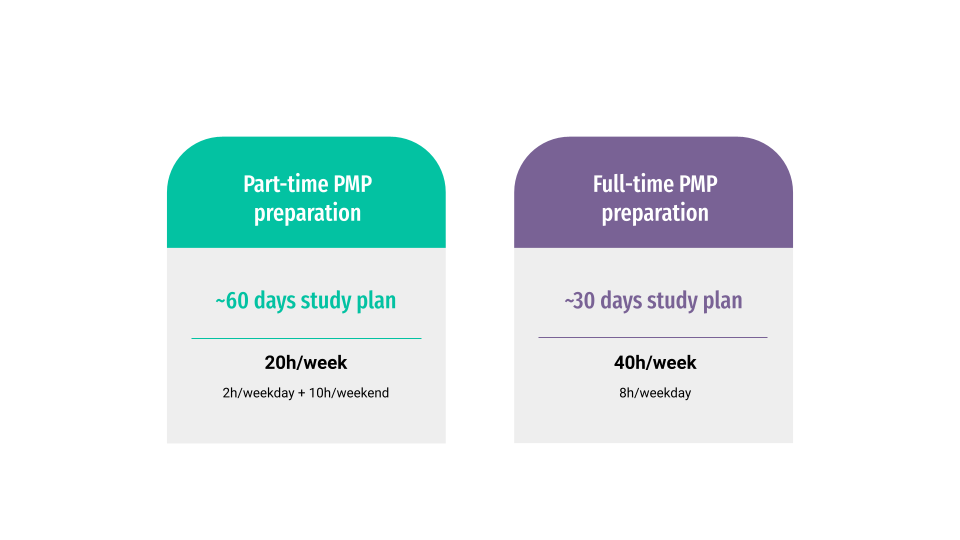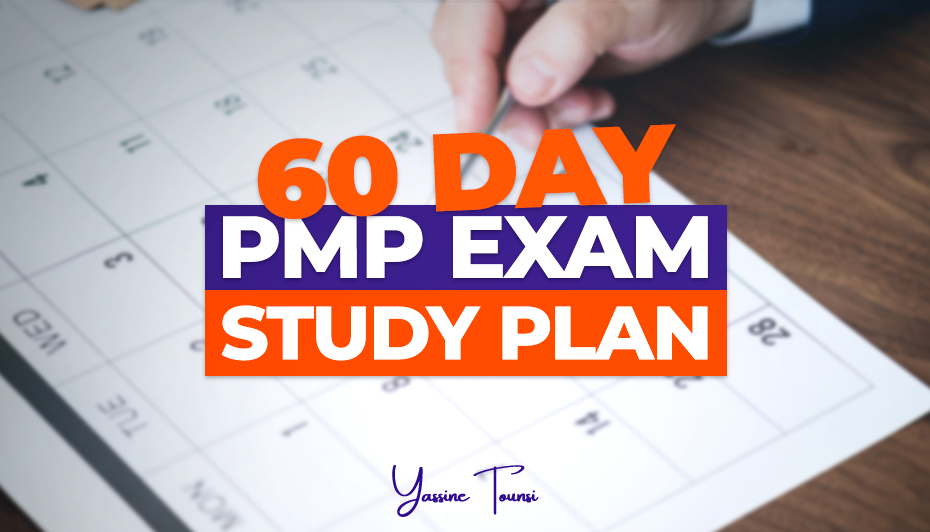The PMP exam is quite tough, usually requiring extensive preparation over the course of many weeks, or even months, with a lot of material to cover. As a PMP aspirant, you will need to be able to master the practical applications of the information you’re going to absorb. Therefore, in order to successfully acquire your certificate, you must allocate the right combination of time, dedication, and diligence.
Robert Herjavec, in his book The Will to Win: Leading, Competing, Succeeding stated: “A goal without a timeline is just a dream”. Applying this to studying for the Project Management Professional certification exam means that you should set up a thoroughly detailed timeline of when and how you’re going to carry out your preparation plan in order to reach your final goal. Starting with the end in mind allows you to treat your study plan like a project, allocating the needed resources, implementing a step-by-step action plan, and time-framing the whole process.
In this guide, I am going to show you how to create your very own study plan. We’re beginning with the main factors that you should take into consideration before setting up the plan, and then we’re moving on to my own personal experience of how I prepared and passed my PMP exam, along with some final tips.
Before going into details, it is very important to understand that a study plan that may have worked for someone else may not work for you. No two people have the same experiences or expertise, nor does everyone learn in the same manner. Some candidates would prefer a more relaxed preparation pace whereas others set strict deadlines and stringent studying plans. This ultimately depends on each person’s learning pattern and style.
Without further ado, let’s get started!
Creating Your Study Plan
When developing your study plan, start with two main factors in mind: Budget, and Time.
How much you intend to invest in your PMP preparation is an important component of your overall study plan. Deciding on how much you are prepared to invest in the exam preparation will help you determine which material you’re going to tackle.
Setting a specific budget for resources, training, courses, PMP simulators, etc. will help you create an accurate schedule of the material you’re going through for your preparation. Start with setting up a specific budget, and then do your research on the best resources you can rely on for your studying.

Now that you have decided on your budget, and before ordering any studying materials or enrolling in courses, you should create your preparation plan. Deciding to pass the PMP exam doesn’t just happen overnight or out of the blue. You must have taken time to consider this decision and finally make it. Usually, you have an approximate date in mind when you wish to pass the exam. Depending on how much time you decide to dedicate to your preparation, and after setting up an approximate schedule for when you’ll be ready to take the exam, you can then book the exam date. I recommend that you decide on a date that is not too far in the future, but not impossibly near to give yourself enough time to prepare.
Setting a specific date will make you more motivated to stick to your schedule, and will prevent any postponing or slacking. Login to your profile on pmi.org and under the PMP certification section, you will see the “schedule PMP exam” option. You can reschedule your PMP certification exam appointment in case you still don’t feel prepared enough, but you’ll have to pay $70 as a rescheduling fee if you change the date 30 days before the initially booked date, and if you reschedule within two days of the booked date, you’ll have to pay the exam fee again.
PMP Preparation Materials
There is a misconception that the PMP exam is based on the PMBOK Guide. It is not! PMI, the organization behind PMP, does not endorse specific review courses, resources, references, or any other material for certification preparation. However, they do have a list of ten recommended resources for the PMP exam preparation, including the PMBOK and the Agile practice guide.
The PMP exam is based on the Exam Content Outline (ECO). It describes the domains, tasks, knowledge, and skills that are tested in the PMP exam. It is like the syllabus for the certification exam. Although many of the domains, tasks, knowledge, and skills outlined in the PMP exam content outline are also covered in the PMBOK guide, there are some that are unique to the PMP Exam Content Outline.
You can rely on five main sources for your PMP preparation: The PMBOK Guide, the Agile practice guide, preparation books, onsite or online courses, and exam simulators or mock tests.

- Candidates studying for PMP certainly want to refer to the latest edition of the PMBOK guide. The current version is the 7th Edition, and even though PMI did not make any changes to the exam upon releasing the PMBOK new edition, they did update the exam reference list to include PMBOK with no specific indication of a certain edition. This means PMP aspirants can refer to both the 6th and 7th editions of the guide when preparing for the PMP certification.
- Along with the PMBOK, the PMI included 10 different resources in their PMP Exam Reference List. With the new exam updates, Agile is being emphasized more than ever. Consequently, the Agile Practice Guide should take part as a key source for your preparation too. You might also want to refer to other materials included in the PMI list such as Essential Scrum by Kenneth S. Rubin.
- PMP training and preparation workshops are also a good choice if you prefer a classroom setting or need more one-on-one interaction. Several PMP exam preparation courses are also available online. These online courses tend to be less expensive than in-person training workshops. Some courses fulfill the 35 contact hours required for the PMP exam application.
- A good PMP textbook can be a plus for your preparation. Books such as the Essential PMP Preparation Guide will help you ease your PMP exam study.
- Your PMP preparation plan must include practice exams. You can either use a PMP exam simulator or PMP mock tests. PMP simulators aim to replicate the exam environment so you become comfortable with the timing and the pressure. You can search on Udemy for instance, to find numerous online courses offering mock tests. You can also get my PMP Mock Practice Tests book to evaluate your readiness, go over your mistakes, and identify your knowledge gaps.
If you still have a hard time finding good resources for where to look up some obscure information, simply try Googling whatever you’re having trouble understanding. There are also a lot of good videos on Youtube explaining complex concepts in simple terms.
PMP Preparation Approach
After doing some research and deciding on what you’re going to use for preparation, your plan should be based on three phases:
- Getting familiar with the material
- Mastering the material
- Practicing and testing your knowledge
The goal of the first phase is to familiarize yourself with the PMBOK guide content, as well as the Agile Practice guide, to help you understand how you can implement better project management practices in an uncertain environment where things keep changing. During this phase, you can also read preparatory books.
You should identify your phase end criteria, for example, you can set the score you want to get in lessons’ end quizzes. You can use quizzes from any book or study material available to you. How long this part of your study plan will take depends on how much project management knowledge and experience you already have.
After getting familiar with your material content, now it’s time to master the fundamental concepts. Don’t leave anything to chance, dig deeper if something is not clear. Make sure you have a good grasp of the Agile approach, its characteristics, and how it’s applied. Try to fully comprehend the processes of managing scope, budget and schedule in a predictive environment.
You want to cover the tools and techniques of risks, quality, procurements, resources, and stakeholder management. Since a good part of the project is about people, you should pay more attention to leadership styles, problem-solving techniques, and communication.
Now, it’s time to practice and test your knowledge. The goal of this third phase is to identify any knowledge gaps. Pick some reliable and good questions resources and practice 3 to 4 full-length exams. It is very important to practice as many questions as possible but what is more important here is what you learn from each question. Scoring 70% or higher in exam simulations is recommended as this phase end criteria.
PMP Preparation Schedule
The time you’ll need to prepare for the PMP exam fully depends on the number of hours you can dedicate to studying every day. It’s not the same for someone who decided to take preparation as a full-time mission as it’s for someone who’s an active professional.
For instance, let’s assume that you have a full-time job, so on weekdays, you can dedicate 2 hours every day to preparation. And, on the weekends you can devote 10 hours on both days to studying. This would translate into 20 hours of study every week which means you can tackle your PMP preparation in 2 months. Of course, for someone who’s going to dedicate all their time to studying it will be easier to clear the exam in a shorter period.

Try to develop specific milestones and a realistic schedule when implementing your study plan and identify what you will study, when, and for how long. Also, when creating your study schedule, take into consideration that it may be affected by unforeseen events that will require adjusting your schedule. Life happens, so it is better to alter your study schedule or even reschedule your exam date than to rush your studying and show up for the exam ill-prepared and risk not passing.
Final Tips
Now that you know how to pick your studying resources, how to go through the material, and how to create a convenient plan for your own requirements and needs, I have some final tips:
- Take your own notes: your PMP studying notes really make a difference. Take notes of important facts, concepts, and formulas to make it easier for you to retain and recall information.
- Don’t neglect PMP vocabulary: a lack of understanding of the PMBOK guide vocabulary is one of the most common causes of candidates not passing the exam on their first attempt. Therefore, it is so important that you thoroughly study, understand, and retain all new vocabulary.
- DO not memorize without understanding: Getting your PMP certification is based on your ability to think and respond as a project manager, not how well you memorize project management information. It is more important to understand the hows, whys, and logical relationships than it is to attempt to memorize them. A majority of the PMP exam questions are situational descriptions of a problem. They contain enough information for you to arrive at the best answer, but they also include irrelevant information to deliberately test your understanding.
- Participate in study groups and discussion forums: Study groups and discussion forums can greatly help you prepare for your PMP exam. As an active participant in study groups and discussion forums, you can get your concerns addressed and queries answered, learn more about several useful resources, and thus significantly reduce the time required to prepare for the exam.
- Go easy on yourself: Break up your study sessions into smaller chunks with short breaks in between where you disengage from studying. This will make the whole process easier and less stressful.
Now you have a complete picture of how creating a PMP study plan takes place. A detailed PMP study plan is critical for your success in the exam. But, committing to the schedule is the real key to successfully getting certified on your first try.
I hope this guide covered all the questions you have about creating a study plan, and I hope it’ll help you set up an efficient map to ultimately achieve your goal. Don’t hesitate to reach out through my contact channels if you still have any inquiries to address. I am more than happy to offer advice and answer questions to help you with anything concerning the PMP exam.
Good luck!
Images credit: Slidesgo and Freepik.
